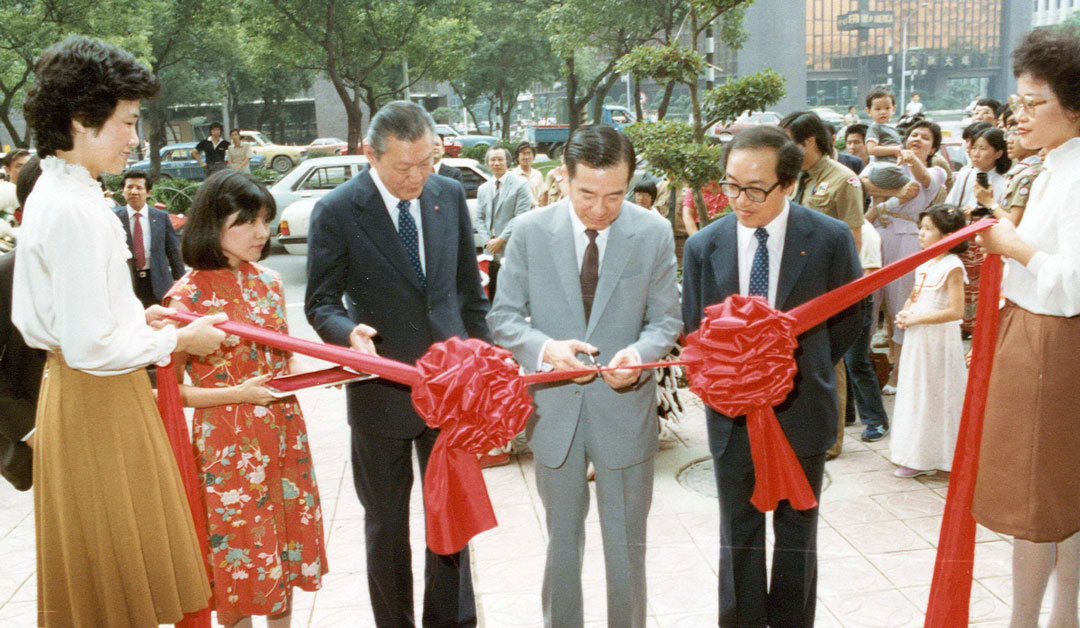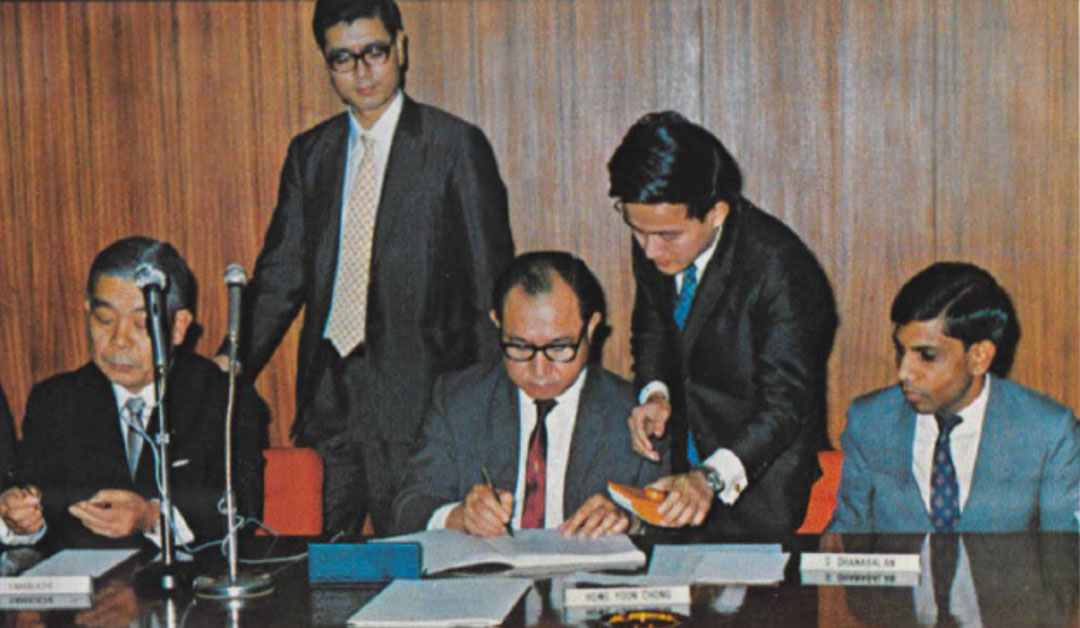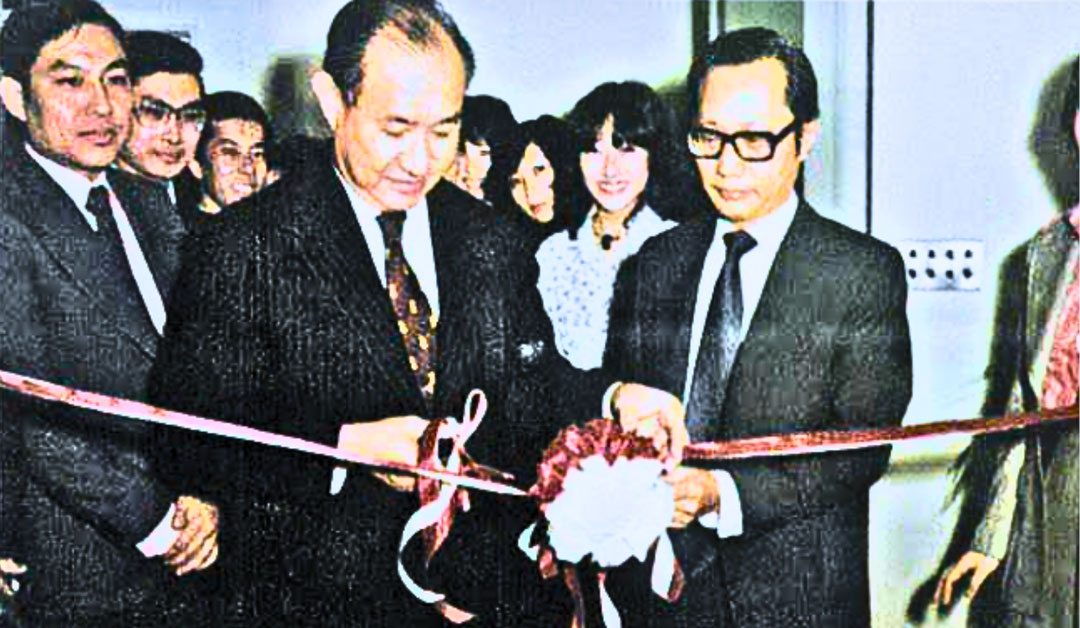spreading-our-wings
Spreading Our WingsThe international start-up: Tales of DBS’ overseas forays
By DBS and The Nutgraf, 2 Aug 2023

The official opening of the first branch in Taipei in 1983, making it the bank’s seventh branch overseas. Photo: DBS
The articles in this series are presented jointly by DBS and content agency The Nutgraf. In the lead up to the bank’s 55th anniversary, The Nutgraf team interviewed 12 alumni to uncover these lesser-known stories about the bank in its early days, and its key contributions to a young and developing Singapore.
The sounds of distant gunfire were in the air when DBS veteran Tan Soo Nan and his two colleagues landed in Colombo in 1989.
Sri Lanka was in the throes of a violent civil war, with death and devastation rocking the capital city. Night-time curfews imposed to restrict residents from straying into gunfire. The mood was tense as the three DBS officers discussed in the airport how to secure the objectives of their own mission.
Mr Tan and his two colleagues were representing DBS as Asian Development Bank (ADB) consultants to help the local government raise development funding from retail investors.
“When the flight landed in Colombo, you had two options. Option one: stay at the airport for the night because the curfew had started, and then go to the hotel in the morning. Second option: get a permit to travel to your hotel during the lockdown,” recalled Mr Tan.
“We decided that we could not sleep at the airport, it was just not comfortable. So we took the car, and we had to pass many checkpoints. The security guards would check your passport while pointing a gun at you – in case you made a move, or you were a Tamil Tiger terrorist in disguise, they’d shoot you,” he said.
That incident would not be the last brush with danger that Mr Tan would encounter during his Sri Lankan mission to provide consulting services on setting up a unit trust. This was just one of many new initiatives that DBS bankers undertook to expand the portfolio of international projects for the bank.
Bond ambitions
New ventures have long been the lifeblood of DBS, which was born as a development bank tasked to jumpstart Singapore’s industrialisation and grow new strategic sectors. Venturing overseas was a part of this mandate.
From expanding its geographic footprint to supporting the development of Singapore’s financial markets, DBS worked in entrepreneurial ways. One such endeavour was DBS’ launch of the first Asian dollar bond issue in Singapore. In December 1971, it jumpstarted the Asian dollar bond market with a USD 10 million issue, with the aim of establishing Singapore as a regional hub for infrastructural and development fund-raising.
DBS would go on to issue many more such bonds, and it was often the only Singapore bank in an international consortium of underwriters on these transactions. In 1981 alone, DBS was the market leader, co-managing 10 of the 22 Asian dollar bond issues floated in Singapore, raising USD 584 million.
International standing
Next, the bank set its sights on becoming an active participant in international transactions.
The thinking behind this was simple. As Mr Howe Yoon Chong, then Chairman and President of DBS explained in a 28 June 1972 Straits Times article, “The growing importance of the Asian dollar market and the Bank’s leading role to foster the further development of Singapore as an Asian dollar centre makes it necessary for DBS to extend its business beyond the boundaries of Singapore.”

DBS Chairman and President, Mr Howe Yoon Chong, signing the Underwriters Agreement on the Asian Dollar Bond issue in 1971. Photo: DBS
“Our participation in consortium loans for regional development and the floating of the DBS Bond Issue in 1971 are just the beginning,” he wrote.
To do this, DBS invested in helping its talent to learn best practices from overseas so they could stand tall on the international stage.
Mr Tan, who joined the bank in 1971, was a beneficiary of this push. His training included a nine-month stint in a World Bank-sponsored programme in India – which at that time was “years ahead of Singapore” in development financing – as well as attachments with big finance houses in New York and Tokyo.
Even as a relatively junior officer, he was also given the opportunity and support to cut his teeth on major international transactions. One project involved DBS in an international consortium structuring an Asian dollar bond issue for a European investment bank, which was a test of resolve for Mr Tan as he had to stand his ground defending DBS’ position on how to price the issue in Singapore.
“The group of international banks wanted to lower the rate for that Asian dollar bond issue. But when it came to my turn, I said, ‘No, I don't agree with your assessment. You cannot lower the interest rate. Instead, we should be increasing the interest rate.’,” recalled Mr Tan.
“There was a stalemate, as we kept putting across arguments. We started at around 7pm and went on till past 10pm at night,” he said.
At nearly 11pm, Mr Tan made a phone call to Mr Howe to tell him about the impasse in the pricing discussion. “I was a bit concerned because these are all big international banks, and I was the only one representing DBS,” he said candidly.
“I explained the situation to him, and his reply to me was very supportive. All he said was, ‘If you had done your homework, and if you believe that your position is correct, stay with it. And if there should be any negative fallout or comment, don't worry, I'm with you.’”
Big wins
As DBS garnered more experience in handling international transactions, it started to woo even bigger players to enhance Singapore’s reputation as a leading Asian financial hub.
A major milestone came in 1984, when DBS arranged the first-ever listing of “Ginnie Maes” – US government mortgage-backed securities – in Asia. The Government National Mortgage Association (GNMA)’s listing of USD 80 billion worth of securities in Singapore was described by US Cabinet Minister Samuel Pierce as a “historic event”.
This was a major boost for DBS, which saw the importance of developing an active secondary market for a more diverse range of financial instruments, as well as attracting more quality listings from major markets like the US.
Sure enough, after Ginnie Mae’s debut in Singapore, blue-chip American companies like Citicorp Overseas Finance Corporation NV and Sears Roebuck would follow suit to float their Asian dollar bonds here.
Not a cushy consulting job
By the 1990s, DBS had gained enough expertise in capital markets and was ready to offer its advisory services regionally.
Mr Tan and Mr Eric Ang, who headed DBS’ capital markets business, applied for the bank to become a consultant to the Asian Development Bank (ADB), recognising that this could open doors to regional advisory projects.
In 1989, DBS won a bid for an ADB financial project, becoming the first Singapore bank to do so. This maiden venture was none other than setting up a unit trust in war-torn Sri Lanka, and Mr Tan and Mr Ang were – not surprisingly – the first to go to the frontlines. They were accompanied by another colleague who was born in Sri Lanka and had migrated to Singapore to work.
After multiple trips between Singapore and Sri Lanka, the team successfully concluded the project, and the unit trust was launched in 1991.
What made this outcome even more gratifying for Mr Tan and his comrades-in-arms was the fact that they lived to tell the tale. They almost didn’t – the day after they gave the final presentation and left Colombo, the boardroom where they held their last meeting was blown up.
“We escaped death,” marvelled Mr Tan. “That ADB project was the most memorable for everyone on the team, both in terms of institutional work and personal experience. You can never forget it.”
DBS’ other ADB financial advisory projects were less nerve-wracking. DBS would return to do another project in Sri Lanka – without guns pointed in its officers’ direction. It also completed a few more across the region, including a joint project with the Singapore Exchange to improve stock trading activities on the Jakarta Stock Exchange in 1990.
Quirky office tales
As DBS’ merchant and commercial banking operations grew with Singapore’s international credit standing in the 1970s, it started to set up overseas offices.

Mr Howe Yoon Chong, at the official opening of the bank’s first overseas branch in Tokyo in 1977. Photo: DBS
DBS’ first international foray was setting up a representative office in Tokyo in 1976, the same year that Singapore became the first Asian country to float a yen-denominated bond issue in Japan. A year later, it was converted into a full-fledged branch in a cocktail reception that featured 5,000 sticks of satay freshly made by two satay-men who flew in from Singapore.
The next stop was London, where DBS opened a representative bank in mid-1979. The process of getting the application approved by the Bank of England then was a relatively circuitous one that required a lot of networking, said DBS veteran Lock Sai Hung, who was in charge of DBS international banking from 1977 to 1979.
“The Bank of England was very conscious about the old boy network. Everything is funneled through this network of connections.”
Mr Lock sought help from DBS’ strong business partner Lloyds Bank to make the necessary introductions. Despite the leg-up, there was no clear indication of when the application would be approved. Mr Lock made several visits to the Bank of England, a venerable institution with archaic traditions such as guards dressed in fine livery.
“You would approach one of the guards and they will speak with a stiff upper lip, ‘Who, Sir, may I have the pleasure of serving?’” he recounted.
“I gave my card, he would open the door a little and shout into the vast cavern, ‘Mr Lock from the Development Bank of Singapore!’. It echoed down that corridor and somebody else would take up the information and pass it on until it reached the Office of the Deputy Governor.”
After Mr Lock was admitted into the austere office, he found that there was no business discussion. “They’re English. They’re known for small talk,” he said, with a wry smile.
He continued with the small talk and banter for a year before the bank finally received the green light to set up its office.
With London in the bag, New York was next.
Unlike the British, the Americans were straight to the point. Through JP Morgan, with whom DBS had a joint venture in Singapore, Mr Lock made an appointment to see the New York banking superintendent.
“She greeted me warmly, like an old friend, and promptly introduced me to an officer who was in charge of processing the application,” he recalled.
The officer produced a pile of documents and told him, “Get your office to complete the documents.”
“Approval was given at six months on the dot. It was a very good experience,” said Mr Lock.
Securing prime office space for the DBS agency was equally smooth. Mr Lock landed at the Newark Airport and was transported by helicopter to the World Trade Centre (WTC), which was owned by the Port Authority of New York.
He was welcomed by the chairman of the Port Authority, a close friend of former DBS chairman Howe Yoon Chong.
“He said, ‘Oh, Mr Lock, I've got everything set up for you. I have reserved space in the 80th story of WTC No.2 for your office.’ And he gave us a 10% discount,” recalled Mr Lock.
The two men then had lunch on at the Windows on the World restaurant on the 110th floor. Twelve years later, that restaurant would be destroyed in the 9/11 terrorist attacks on the WTC twin towers, he soberly noted. DBS’ representative office today is located in Los Angeles.
Over the next few decades, DBS went on to expand overseas, which included opening its first Taiwan branch in Taipei in 1983, a rep office in Jakarta in 1989, a rep office in India in 1994 and a branch in the Dubai in 2006.
Growing like a start-up
DBS also grew its international presence through acquisitions, which included a 2004 merger between DBS’ subsidiary Thai Danu Bank and two other Thai banks to form Thailand’s fifth largest bank; DBS’ takeover of Taiwan’s Bowa bank in 2008, as well as the amalgamation of India’s Lakshmi Vilas Bank into DBS Bank India in 2020.
One notable acquisition is DBS’ purchase of Hong Kong’s Dao Heng Bank in 2001. It was merged two years later with DBS Kwong On Bank and Overseas Trust Bank to form DBS (Hong Kong), which is now the second-largest contributor to the Group’s total loans portfolio at 17% in 2022.
The journey was a long one but the internationalisation drive has firmly put DBS on the global map. From a pure Singapore presence, DBS has now become a leading financial institution with a presence in 19 markets, including its six core markets in Singapore, China, Hong Kong, India, Indonesia and Taiwan.

